Emotional Intelligence: Leadership in Healthcare (HLSC605)
VerifiedAdded on 2023/06/03
|14
|4104
|285
Essay
AI Summary
This essay delves into the critical role of emotional intelligence (EI) in healthcare leadership, exploring how leaders can cultivate EI and leverage it to drive innovation and manage change within healthcare organizations. The essay begins by defining EI and its significance in the healthcare context, emphasizing its impact on workforce management, patient satisfaction, and organizational performance. It highlights the challenges healthcare leaders face, including high-pressure environments and emotional demands from patients and staff. The essay then examines key components of EI, including self-awareness, self-regulation, motivation, and empathy, detailing how these attributes enable leaders to effectively navigate complex situations, manage conflicts, and foster positive work environments. The discussion includes practical examples of how EI can be applied in healthcare scenarios, such as managing patient and staff emotions, addressing internal moral conflicts, and building effective teams. The essay also provides insights into the benefits of each EI component, emphasizing how they contribute to improved communication, conflict resolution, and overall organizational success. The essay concludes by underscoring the importance of EI in fostering an innovative and adaptable healthcare environment.
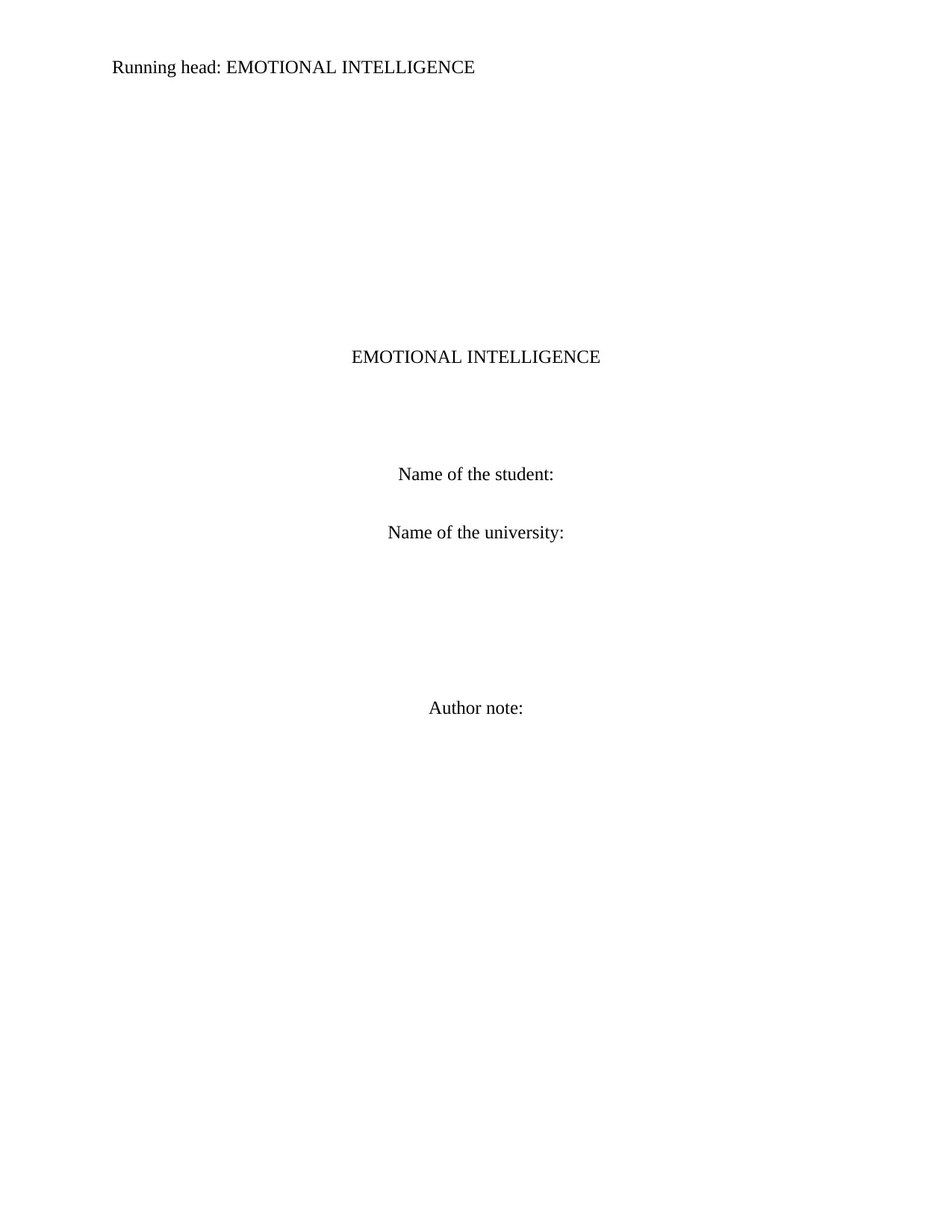
Running head: EMOTIONAL INTELLIGENCE
EMOTIONAL INTELLIGENCE
Name of the student:
Name of the university:
Author note:
EMOTIONAL INTELLIGENCE
Name of the student:
Name of the university:
Author note:
Paraphrase This Document
Need a fresh take? Get an instant paraphrase of this document with our AI Paraphraser
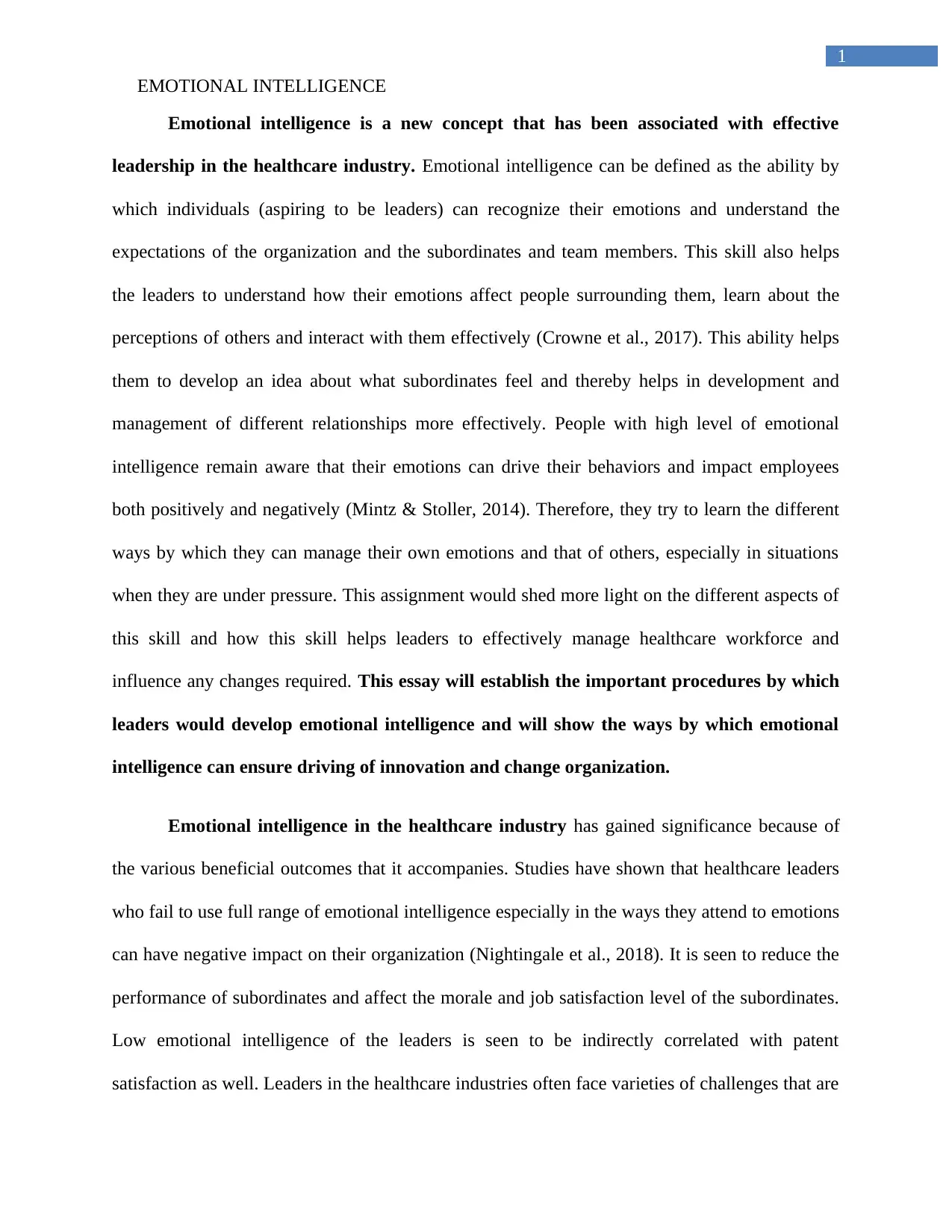
1
EMOTIONAL INTELLIGENCE
Emotional intelligence is a new concept that has been associated with effective
leadership in the healthcare industry. Emotional intelligence can be defined as the ability by
which individuals (aspiring to be leaders) can recognize their emotions and understand the
expectations of the organization and the subordinates and team members. This skill also helps
the leaders to understand how their emotions affect people surrounding them, learn about the
perceptions of others and interact with them effectively (Crowne et al., 2017). This ability helps
them to develop an idea about what subordinates feel and thereby helps in development and
management of different relationships more effectively. People with high level of emotional
intelligence remain aware that their emotions can drive their behaviors and impact employees
both positively and negatively (Mintz & Stoller, 2014). Therefore, they try to learn the different
ways by which they can manage their own emotions and that of others, especially in situations
when they are under pressure. This assignment would shed more light on the different aspects of
this skill and how this skill helps leaders to effectively manage healthcare workforce and
influence any changes required. This essay will establish the important procedures by which
leaders would develop emotional intelligence and will show the ways by which emotional
intelligence can ensure driving of innovation and change organization.
Emotional intelligence in the healthcare industry has gained significance because of
the various beneficial outcomes that it accompanies. Studies have shown that healthcare leaders
who fail to use full range of emotional intelligence especially in the ways they attend to emotions
can have negative impact on their organization (Nightingale et al., 2018). It is seen to reduce the
performance of subordinates and affect the morale and job satisfaction level of the subordinates.
Low emotional intelligence of the leaders is seen to be indirectly correlated with patent
satisfaction as well. Leaders in the healthcare industries often face varieties of challenges that are
EMOTIONAL INTELLIGENCE
Emotional intelligence is a new concept that has been associated with effective
leadership in the healthcare industry. Emotional intelligence can be defined as the ability by
which individuals (aspiring to be leaders) can recognize their emotions and understand the
expectations of the organization and the subordinates and team members. This skill also helps
the leaders to understand how their emotions affect people surrounding them, learn about the
perceptions of others and interact with them effectively (Crowne et al., 2017). This ability helps
them to develop an idea about what subordinates feel and thereby helps in development and
management of different relationships more effectively. People with high level of emotional
intelligence remain aware that their emotions can drive their behaviors and impact employees
both positively and negatively (Mintz & Stoller, 2014). Therefore, they try to learn the different
ways by which they can manage their own emotions and that of others, especially in situations
when they are under pressure. This assignment would shed more light on the different aspects of
this skill and how this skill helps leaders to effectively manage healthcare workforce and
influence any changes required. This essay will establish the important procedures by which
leaders would develop emotional intelligence and will show the ways by which emotional
intelligence can ensure driving of innovation and change organization.
Emotional intelligence in the healthcare industry has gained significance because of
the various beneficial outcomes that it accompanies. Studies have shown that healthcare leaders
who fail to use full range of emotional intelligence especially in the ways they attend to emotions
can have negative impact on their organization (Nightingale et al., 2018). It is seen to reduce the
performance of subordinates and affect the morale and job satisfaction level of the subordinates.
Low emotional intelligence of the leaders is seen to be indirectly correlated with patent
satisfaction as well. Leaders in the healthcare industries often face varieties of challenges that are
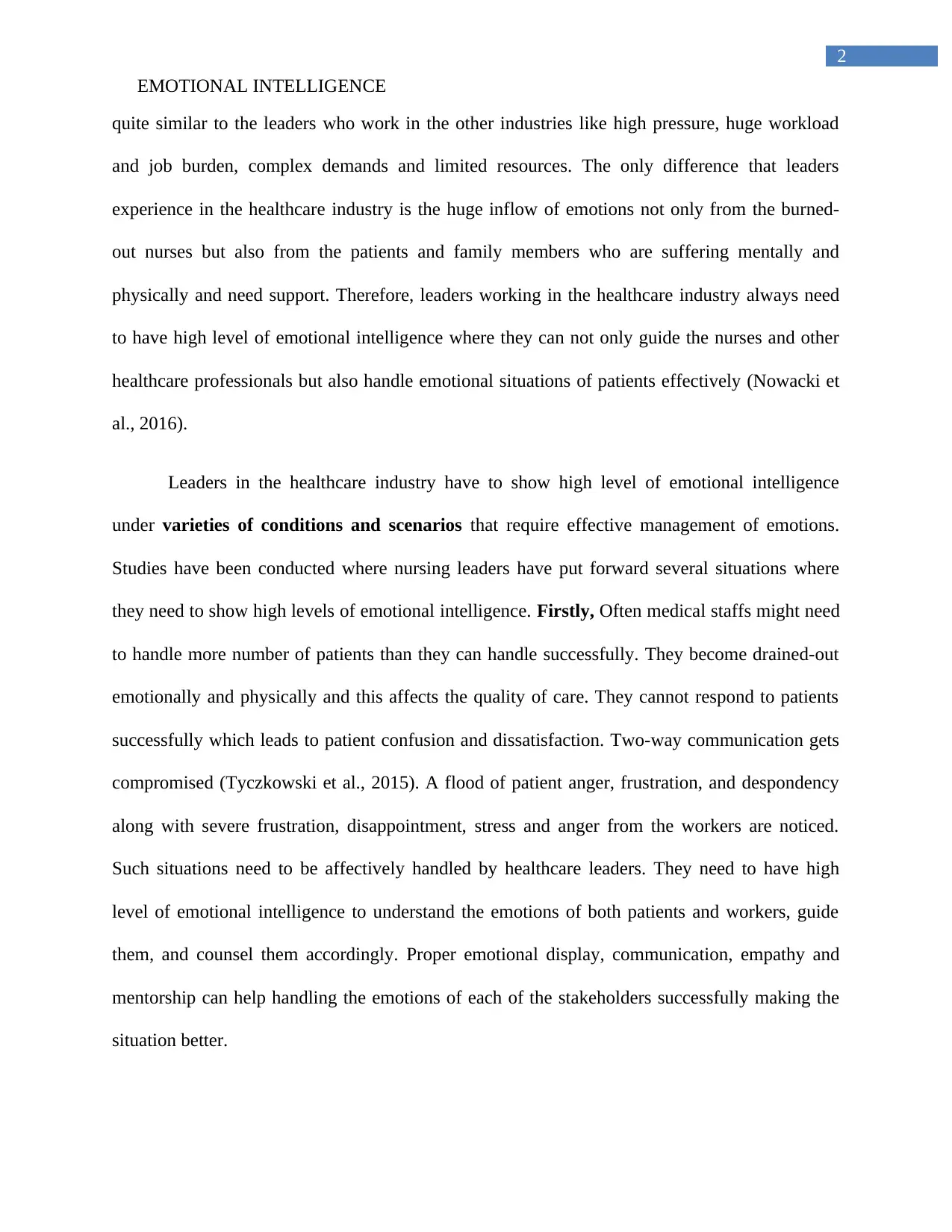
2
EMOTIONAL INTELLIGENCE
quite similar to the leaders who work in the other industries like high pressure, huge workload
and job burden, complex demands and limited resources. The only difference that leaders
experience in the healthcare industry is the huge inflow of emotions not only from the burned-
out nurses but also from the patients and family members who are suffering mentally and
physically and need support. Therefore, leaders working in the healthcare industry always need
to have high level of emotional intelligence where they can not only guide the nurses and other
healthcare professionals but also handle emotional situations of patients effectively (Nowacki et
al., 2016).
Leaders in the healthcare industry have to show high level of emotional intelligence
under varieties of conditions and scenarios that require effective management of emotions.
Studies have been conducted where nursing leaders have put forward several situations where
they need to show high levels of emotional intelligence. Firstly, Often medical staffs might need
to handle more number of patients than they can handle successfully. They become drained-out
emotionally and physically and this affects the quality of care. They cannot respond to patients
successfully which leads to patient confusion and dissatisfaction. Two-way communication gets
compromised (Tyczkowski et al., 2015). A flood of patient anger, frustration, and despondency
along with severe frustration, disappointment, stress and anger from the workers are noticed.
Such situations need to be affectively handled by healthcare leaders. They need to have high
level of emotional intelligence to understand the emotions of both patients and workers, guide
them, and counsel them accordingly. Proper emotional display, communication, empathy and
mentorship can help handling the emotions of each of the stakeholders successfully making the
situation better.
EMOTIONAL INTELLIGENCE
quite similar to the leaders who work in the other industries like high pressure, huge workload
and job burden, complex demands and limited resources. The only difference that leaders
experience in the healthcare industry is the huge inflow of emotions not only from the burned-
out nurses but also from the patients and family members who are suffering mentally and
physically and need support. Therefore, leaders working in the healthcare industry always need
to have high level of emotional intelligence where they can not only guide the nurses and other
healthcare professionals but also handle emotional situations of patients effectively (Nowacki et
al., 2016).
Leaders in the healthcare industry have to show high level of emotional intelligence
under varieties of conditions and scenarios that require effective management of emotions.
Studies have been conducted where nursing leaders have put forward several situations where
they need to show high levels of emotional intelligence. Firstly, Often medical staffs might need
to handle more number of patients than they can handle successfully. They become drained-out
emotionally and physically and this affects the quality of care. They cannot respond to patients
successfully which leads to patient confusion and dissatisfaction. Two-way communication gets
compromised (Tyczkowski et al., 2015). A flood of patient anger, frustration, and despondency
along with severe frustration, disappointment, stress and anger from the workers are noticed.
Such situations need to be affectively handled by healthcare leaders. They need to have high
level of emotional intelligence to understand the emotions of both patients and workers, guide
them, and counsel them accordingly. Proper emotional display, communication, empathy and
mentorship can help handling the emotions of each of the stakeholders successfully making the
situation better.
⊘ This is a preview!⊘
Do you want full access?
Subscribe today to unlock all pages.

Trusted by 1+ million students worldwide
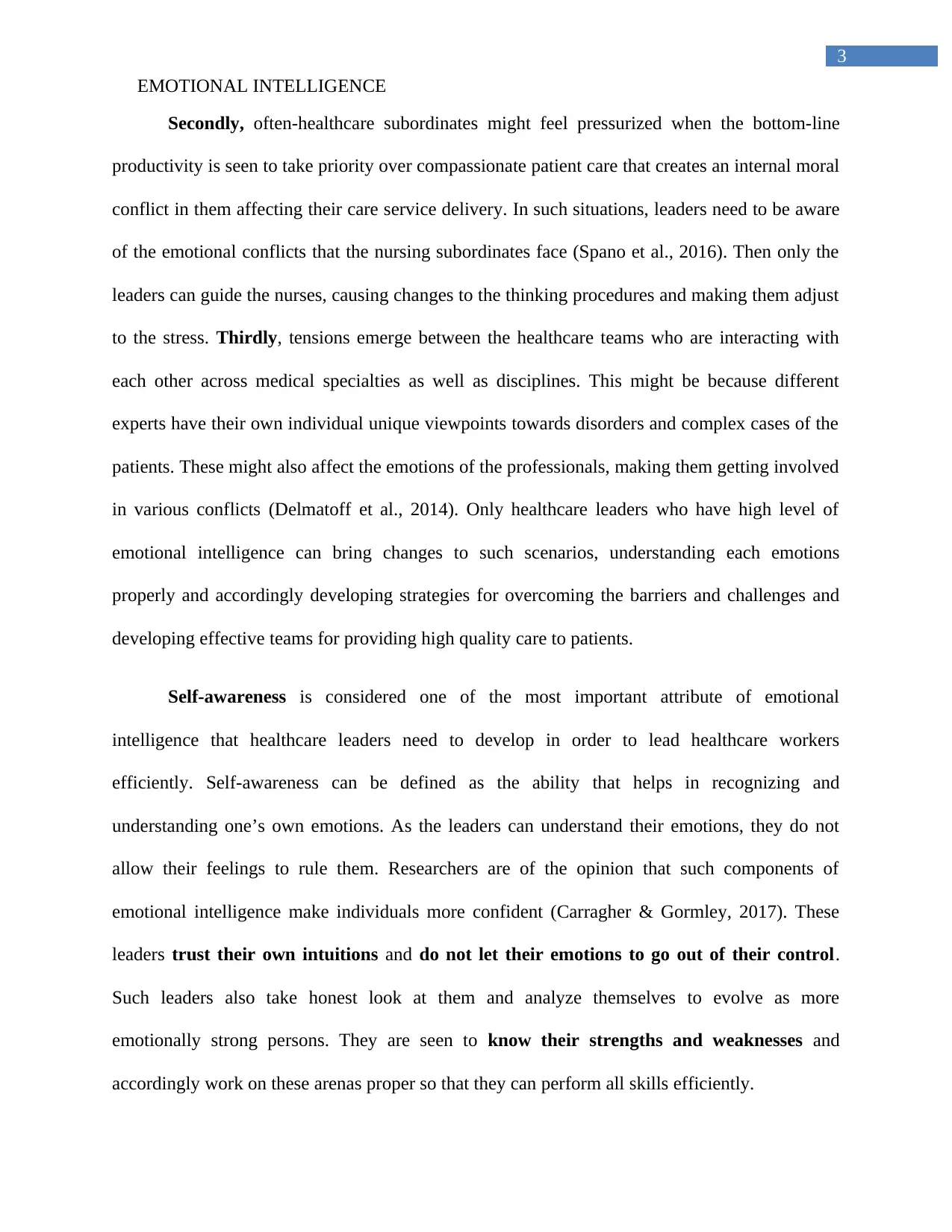
3
EMOTIONAL INTELLIGENCE
Secondly, often-healthcare subordinates might feel pressurized when the bottom-line
productivity is seen to take priority over compassionate patient care that creates an internal moral
conflict in them affecting their care service delivery. In such situations, leaders need to be aware
of the emotional conflicts that the nursing subordinates face (Spano et al., 2016). Then only the
leaders can guide the nurses, causing changes to the thinking procedures and making them adjust
to the stress. Thirdly, tensions emerge between the healthcare teams who are interacting with
each other across medical specialties as well as disciplines. This might be because different
experts have their own individual unique viewpoints towards disorders and complex cases of the
patients. These might also affect the emotions of the professionals, making them getting involved
in various conflicts (Delmatoff et al., 2014). Only healthcare leaders who have high level of
emotional intelligence can bring changes to such scenarios, understanding each emotions
properly and accordingly developing strategies for overcoming the barriers and challenges and
developing effective teams for providing high quality care to patients.
Self-awareness is considered one of the most important attribute of emotional
intelligence that healthcare leaders need to develop in order to lead healthcare workers
efficiently. Self-awareness can be defined as the ability that helps in recognizing and
understanding one’s own emotions. As the leaders can understand their emotions, they do not
allow their feelings to rule them. Researchers are of the opinion that such components of
emotional intelligence make individuals more confident (Carragher & Gormley, 2017). These
leaders trust their own intuitions and do not let their emotions to go out of their control.
Such leaders also take honest look at them and analyze themselves to evolve as more
emotionally strong persons. They are seen to know their strengths and weaknesses and
accordingly work on these arenas proper so that they can perform all skills efficiently.
EMOTIONAL INTELLIGENCE
Secondly, often-healthcare subordinates might feel pressurized when the bottom-line
productivity is seen to take priority over compassionate patient care that creates an internal moral
conflict in them affecting their care service delivery. In such situations, leaders need to be aware
of the emotional conflicts that the nursing subordinates face (Spano et al., 2016). Then only the
leaders can guide the nurses, causing changes to the thinking procedures and making them adjust
to the stress. Thirdly, tensions emerge between the healthcare teams who are interacting with
each other across medical specialties as well as disciplines. This might be because different
experts have their own individual unique viewpoints towards disorders and complex cases of the
patients. These might also affect the emotions of the professionals, making them getting involved
in various conflicts (Delmatoff et al., 2014). Only healthcare leaders who have high level of
emotional intelligence can bring changes to such scenarios, understanding each emotions
properly and accordingly developing strategies for overcoming the barriers and challenges and
developing effective teams for providing high quality care to patients.
Self-awareness is considered one of the most important attribute of emotional
intelligence that healthcare leaders need to develop in order to lead healthcare workers
efficiently. Self-awareness can be defined as the ability that helps in recognizing and
understanding one’s own emotions. As the leaders can understand their emotions, they do not
allow their feelings to rule them. Researchers are of the opinion that such components of
emotional intelligence make individuals more confident (Carragher & Gormley, 2017). These
leaders trust their own intuitions and do not let their emotions to go out of their control.
Such leaders also take honest look at them and analyze themselves to evolve as more
emotionally strong persons. They are seen to know their strengths and weaknesses and
accordingly work on these arenas proper so that they can perform all skills efficiently.
Paraphrase This Document
Need a fresh take? Get an instant paraphrase of this document with our AI Paraphraser
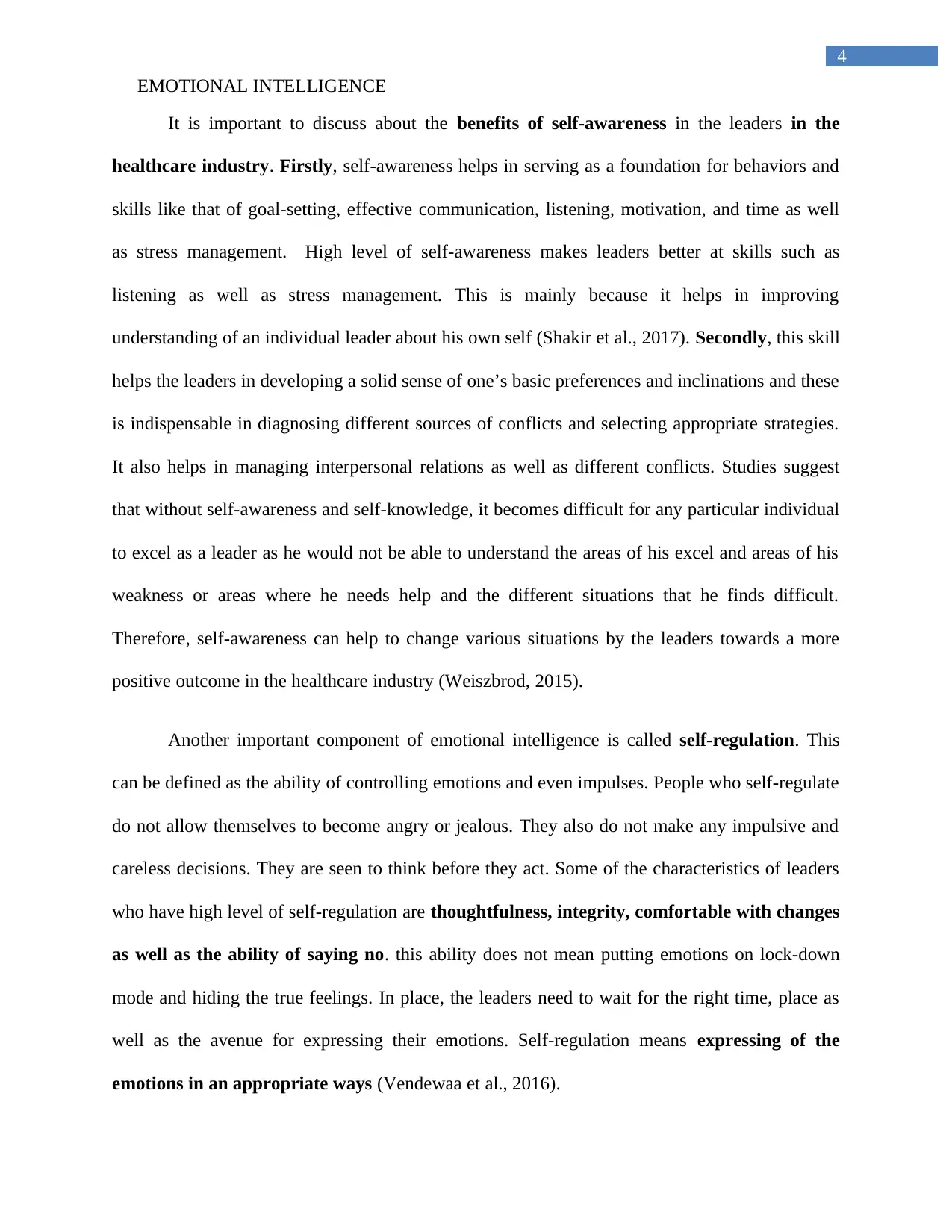
4
EMOTIONAL INTELLIGENCE
It is important to discuss about the benefits of self-awareness in the leaders in the
healthcare industry. Firstly, self-awareness helps in serving as a foundation for behaviors and
skills like that of goal-setting, effective communication, listening, motivation, and time as well
as stress management. High level of self-awareness makes leaders better at skills such as
listening as well as stress management. This is mainly because it helps in improving
understanding of an individual leader about his own self (Shakir et al., 2017). Secondly, this skill
helps the leaders in developing a solid sense of one’s basic preferences and inclinations and these
is indispensable in diagnosing different sources of conflicts and selecting appropriate strategies.
It also helps in managing interpersonal relations as well as different conflicts. Studies suggest
that without self-awareness and self-knowledge, it becomes difficult for any particular individual
to excel as a leader as he would not be able to understand the areas of his excel and areas of his
weakness or areas where he needs help and the different situations that he finds difficult.
Therefore, self-awareness can help to change various situations by the leaders towards a more
positive outcome in the healthcare industry (Weiszbrod, 2015).
Another important component of emotional intelligence is called self-regulation. This
can be defined as the ability of controlling emotions and even impulses. People who self-regulate
do not allow themselves to become angry or jealous. They also do not make any impulsive and
careless decisions. They are seen to think before they act. Some of the characteristics of leaders
who have high level of self-regulation are thoughtfulness, integrity, comfortable with changes
as well as the ability of saying no. this ability does not mean putting emotions on lock-down
mode and hiding the true feelings. In place, the leaders need to wait for the right time, place as
well as the avenue for expressing their emotions. Self-regulation means expressing of the
emotions in an appropriate ways (Vendewaa et al., 2016).
EMOTIONAL INTELLIGENCE
It is important to discuss about the benefits of self-awareness in the leaders in the
healthcare industry. Firstly, self-awareness helps in serving as a foundation for behaviors and
skills like that of goal-setting, effective communication, listening, motivation, and time as well
as stress management. High level of self-awareness makes leaders better at skills such as
listening as well as stress management. This is mainly because it helps in improving
understanding of an individual leader about his own self (Shakir et al., 2017). Secondly, this skill
helps the leaders in developing a solid sense of one’s basic preferences and inclinations and these
is indispensable in diagnosing different sources of conflicts and selecting appropriate strategies.
It also helps in managing interpersonal relations as well as different conflicts. Studies suggest
that without self-awareness and self-knowledge, it becomes difficult for any particular individual
to excel as a leader as he would not be able to understand the areas of his excel and areas of his
weakness or areas where he needs help and the different situations that he finds difficult.
Therefore, self-awareness can help to change various situations by the leaders towards a more
positive outcome in the healthcare industry (Weiszbrod, 2015).
Another important component of emotional intelligence is called self-regulation. This
can be defined as the ability of controlling emotions and even impulses. People who self-regulate
do not allow themselves to become angry or jealous. They also do not make any impulsive and
careless decisions. They are seen to think before they act. Some of the characteristics of leaders
who have high level of self-regulation are thoughtfulness, integrity, comfortable with changes
as well as the ability of saying no. this ability does not mean putting emotions on lock-down
mode and hiding the true feelings. In place, the leaders need to wait for the right time, place as
well as the avenue for expressing their emotions. Self-regulation means expressing of the
emotions in an appropriate ways (Vendewaa et al., 2016).
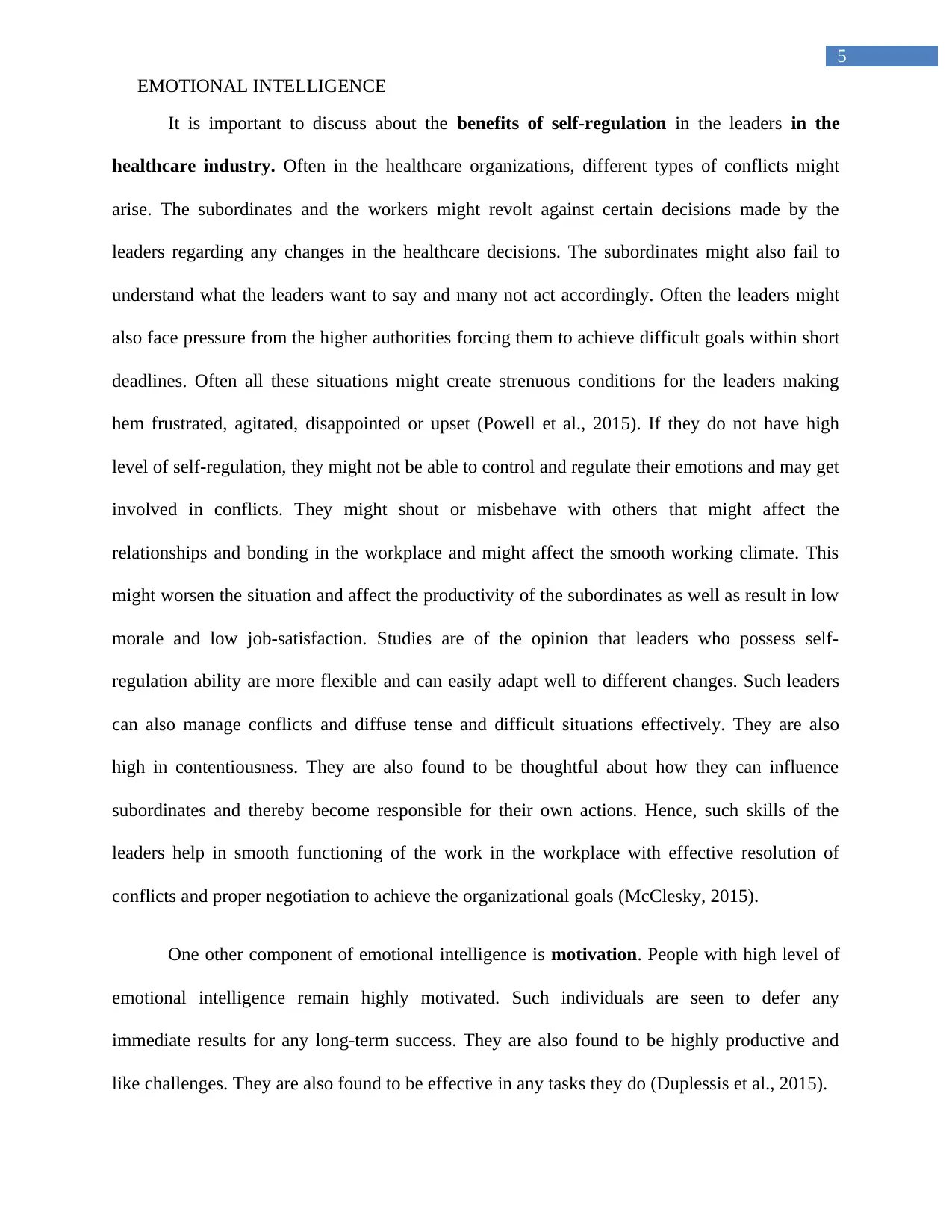
5
EMOTIONAL INTELLIGENCE
It is important to discuss about the benefits of self-regulation in the leaders in the
healthcare industry. Often in the healthcare organizations, different types of conflicts might
arise. The subordinates and the workers might revolt against certain decisions made by the
leaders regarding any changes in the healthcare decisions. The subordinates might also fail to
understand what the leaders want to say and many not act accordingly. Often the leaders might
also face pressure from the higher authorities forcing them to achieve difficult goals within short
deadlines. Often all these situations might create strenuous conditions for the leaders making
hem frustrated, agitated, disappointed or upset (Powell et al., 2015). If they do not have high
level of self-regulation, they might not be able to control and regulate their emotions and may get
involved in conflicts. They might shout or misbehave with others that might affect the
relationships and bonding in the workplace and might affect the smooth working climate. This
might worsen the situation and affect the productivity of the subordinates as well as result in low
morale and low job-satisfaction. Studies are of the opinion that leaders who possess self-
regulation ability are more flexible and can easily adapt well to different changes. Such leaders
can also manage conflicts and diffuse tense and difficult situations effectively. They are also
high in contentiousness. They are also found to be thoughtful about how they can influence
subordinates and thereby become responsible for their own actions. Hence, such skills of the
leaders help in smooth functioning of the work in the workplace with effective resolution of
conflicts and proper negotiation to achieve the organizational goals (McClesky, 2015).
One other component of emotional intelligence is motivation. People with high level of
emotional intelligence remain highly motivated. Such individuals are seen to defer any
immediate results for any long-term success. They are also found to be highly productive and
like challenges. They are also found to be effective in any tasks they do (Duplessis et al., 2015).
EMOTIONAL INTELLIGENCE
It is important to discuss about the benefits of self-regulation in the leaders in the
healthcare industry. Often in the healthcare organizations, different types of conflicts might
arise. The subordinates and the workers might revolt against certain decisions made by the
leaders regarding any changes in the healthcare decisions. The subordinates might also fail to
understand what the leaders want to say and many not act accordingly. Often the leaders might
also face pressure from the higher authorities forcing them to achieve difficult goals within short
deadlines. Often all these situations might create strenuous conditions for the leaders making
hem frustrated, agitated, disappointed or upset (Powell et al., 2015). If they do not have high
level of self-regulation, they might not be able to control and regulate their emotions and may get
involved in conflicts. They might shout or misbehave with others that might affect the
relationships and bonding in the workplace and might affect the smooth working climate. This
might worsen the situation and affect the productivity of the subordinates as well as result in low
morale and low job-satisfaction. Studies are of the opinion that leaders who possess self-
regulation ability are more flexible and can easily adapt well to different changes. Such leaders
can also manage conflicts and diffuse tense and difficult situations effectively. They are also
high in contentiousness. They are also found to be thoughtful about how they can influence
subordinates and thereby become responsible for their own actions. Hence, such skills of the
leaders help in smooth functioning of the work in the workplace with effective resolution of
conflicts and proper negotiation to achieve the organizational goals (McClesky, 2015).
One other component of emotional intelligence is motivation. People with high level of
emotional intelligence remain highly motivated. Such individuals are seen to defer any
immediate results for any long-term success. They are also found to be highly productive and
like challenges. They are also found to be effective in any tasks they do (Duplessis et al., 2015).
⊘ This is a preview!⊘
Do you want full access?
Subscribe today to unlock all pages.

Trusted by 1+ million students worldwide
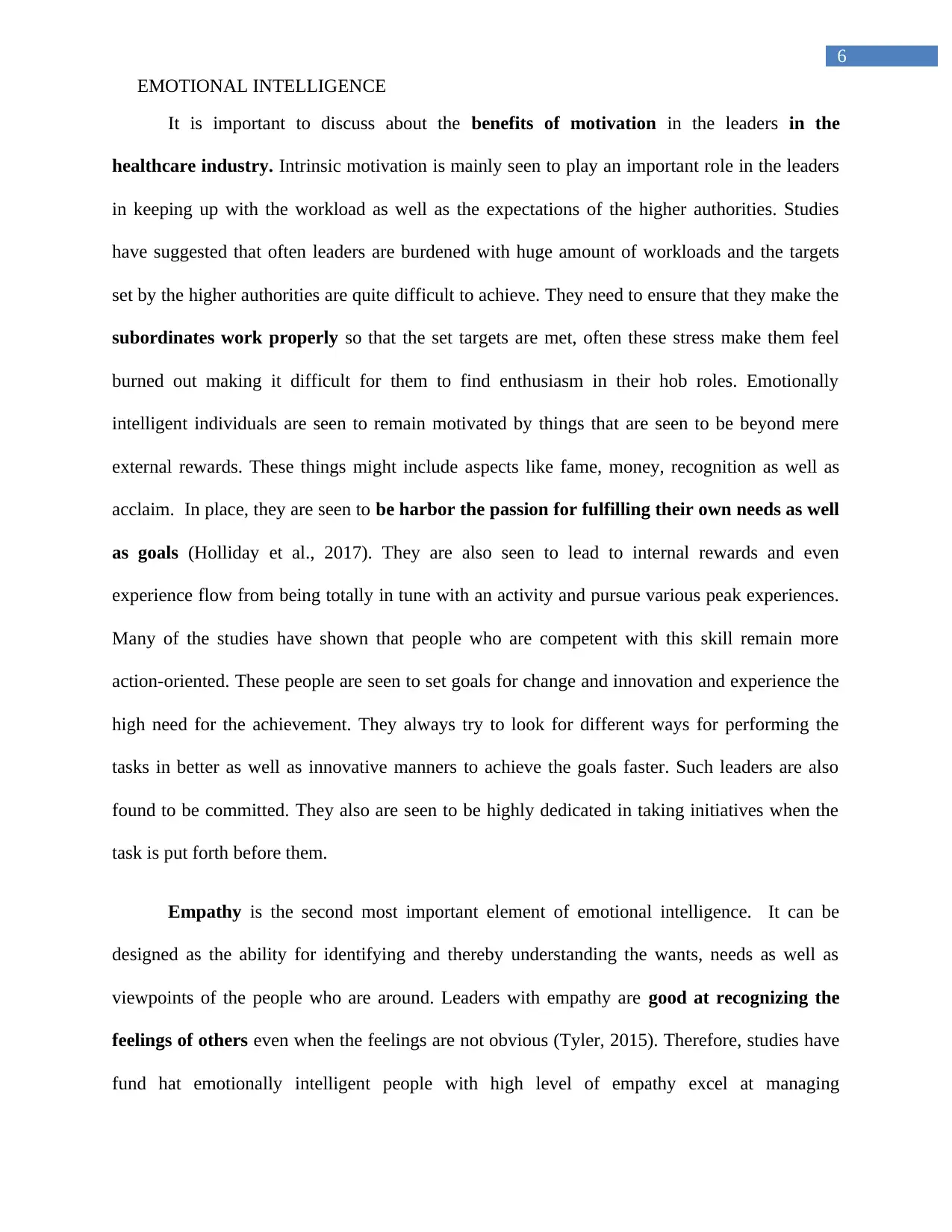
6
EMOTIONAL INTELLIGENCE
It is important to discuss about the benefits of motivation in the leaders in the
healthcare industry. Intrinsic motivation is mainly seen to play an important role in the leaders
in keeping up with the workload as well as the expectations of the higher authorities. Studies
have suggested that often leaders are burdened with huge amount of workloads and the targets
set by the higher authorities are quite difficult to achieve. They need to ensure that they make the
subordinates work properly so that the set targets are met, often these stress make them feel
burned out making it difficult for them to find enthusiasm in their hob roles. Emotionally
intelligent individuals are seen to remain motivated by things that are seen to be beyond mere
external rewards. These things might include aspects like fame, money, recognition as well as
acclaim. In place, they are seen to be harbor the passion for fulfilling their own needs as well
as goals (Holliday et al., 2017). They are also seen to lead to internal rewards and even
experience flow from being totally in tune with an activity and pursue various peak experiences.
Many of the studies have shown that people who are competent with this skill remain more
action-oriented. These people are seen to set goals for change and innovation and experience the
high need for the achievement. They always try to look for different ways for performing the
tasks in better as well as innovative manners to achieve the goals faster. Such leaders are also
found to be committed. They also are seen to be highly dedicated in taking initiatives when the
task is put forth before them.
Empathy is the second most important element of emotional intelligence. It can be
designed as the ability for identifying and thereby understanding the wants, needs as well as
viewpoints of the people who are around. Leaders with empathy are good at recognizing the
feelings of others even when the feelings are not obvious (Tyler, 2015). Therefore, studies have
fund hat emotionally intelligent people with high level of empathy excel at managing
EMOTIONAL INTELLIGENCE
It is important to discuss about the benefits of motivation in the leaders in the
healthcare industry. Intrinsic motivation is mainly seen to play an important role in the leaders
in keeping up with the workload as well as the expectations of the higher authorities. Studies
have suggested that often leaders are burdened with huge amount of workloads and the targets
set by the higher authorities are quite difficult to achieve. They need to ensure that they make the
subordinates work properly so that the set targets are met, often these stress make them feel
burned out making it difficult for them to find enthusiasm in their hob roles. Emotionally
intelligent individuals are seen to remain motivated by things that are seen to be beyond mere
external rewards. These things might include aspects like fame, money, recognition as well as
acclaim. In place, they are seen to be harbor the passion for fulfilling their own needs as well
as goals (Holliday et al., 2017). They are also seen to lead to internal rewards and even
experience flow from being totally in tune with an activity and pursue various peak experiences.
Many of the studies have shown that people who are competent with this skill remain more
action-oriented. These people are seen to set goals for change and innovation and experience the
high need for the achievement. They always try to look for different ways for performing the
tasks in better as well as innovative manners to achieve the goals faster. Such leaders are also
found to be committed. They also are seen to be highly dedicated in taking initiatives when the
task is put forth before them.
Empathy is the second most important element of emotional intelligence. It can be
designed as the ability for identifying and thereby understanding the wants, needs as well as
viewpoints of the people who are around. Leaders with empathy are good at recognizing the
feelings of others even when the feelings are not obvious (Tyler, 2015). Therefore, studies have
fund hat emotionally intelligent people with high level of empathy excel at managing
Paraphrase This Document
Need a fresh take? Get an instant paraphrase of this document with our AI Paraphraser
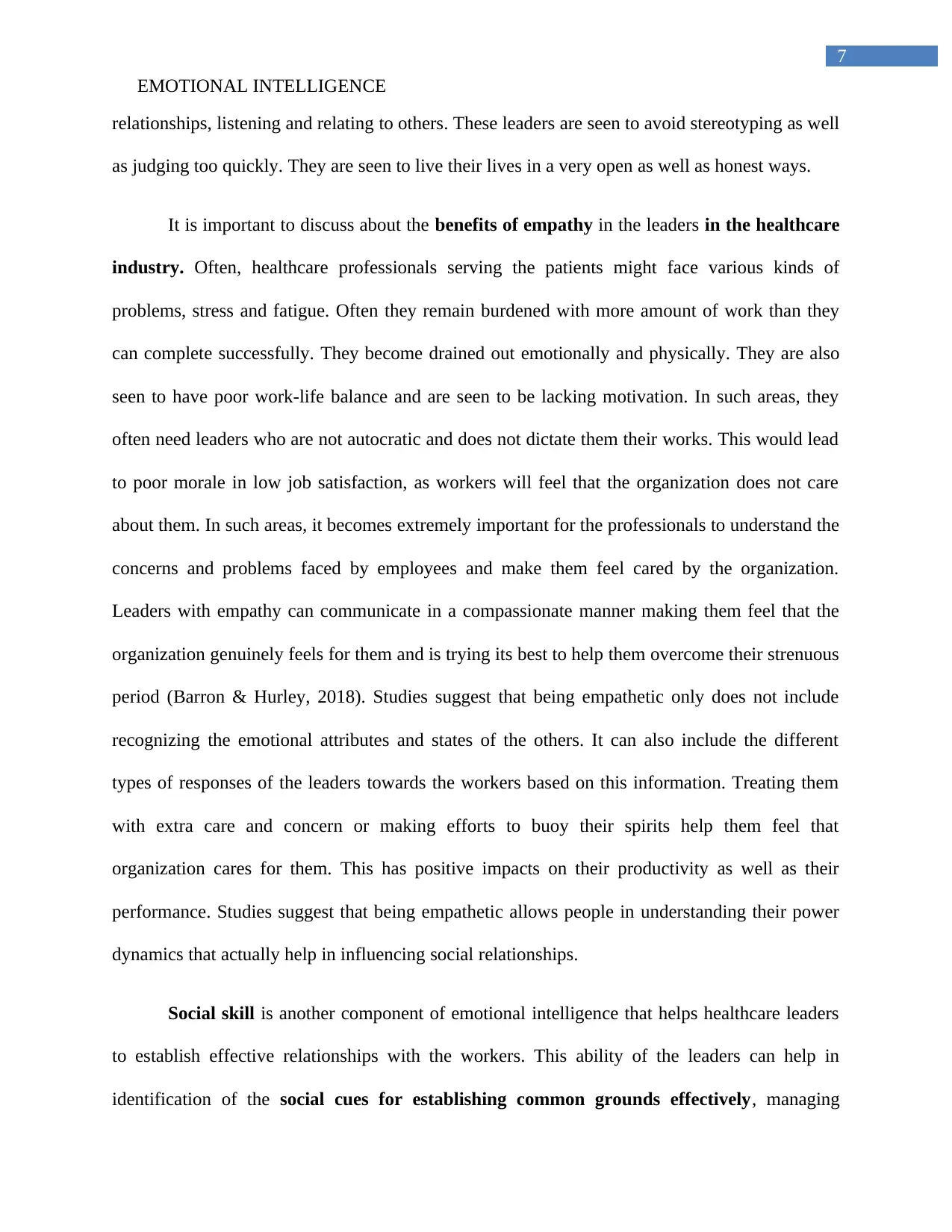
7
EMOTIONAL INTELLIGENCE
relationships, listening and relating to others. These leaders are seen to avoid stereotyping as well
as judging too quickly. They are seen to live their lives in a very open as well as honest ways.
It is important to discuss about the benefits of empathy in the leaders in the healthcare
industry. Often, healthcare professionals serving the patients might face various kinds of
problems, stress and fatigue. Often they remain burdened with more amount of work than they
can complete successfully. They become drained out emotionally and physically. They are also
seen to have poor work-life balance and are seen to be lacking motivation. In such areas, they
often need leaders who are not autocratic and does not dictate them their works. This would lead
to poor morale in low job satisfaction, as workers will feel that the organization does not care
about them. In such areas, it becomes extremely important for the professionals to understand the
concerns and problems faced by employees and make them feel cared by the organization.
Leaders with empathy can communicate in a compassionate manner making them feel that the
organization genuinely feels for them and is trying its best to help them overcome their strenuous
period (Barron & Hurley, 2018). Studies suggest that being empathetic only does not include
recognizing the emotional attributes and states of the others. It can also include the different
types of responses of the leaders towards the workers based on this information. Treating them
with extra care and concern or making efforts to buoy their spirits help them feel that
organization cares for them. This has positive impacts on their productivity as well as their
performance. Studies suggest that being empathetic allows people in understanding their power
dynamics that actually help in influencing social relationships.
Social skill is another component of emotional intelligence that helps healthcare leaders
to establish effective relationships with the workers. This ability of the leaders can help in
identification of the social cues for establishing common grounds effectively, managing
EMOTIONAL INTELLIGENCE
relationships, listening and relating to others. These leaders are seen to avoid stereotyping as well
as judging too quickly. They are seen to live their lives in a very open as well as honest ways.
It is important to discuss about the benefits of empathy in the leaders in the healthcare
industry. Often, healthcare professionals serving the patients might face various kinds of
problems, stress and fatigue. Often they remain burdened with more amount of work than they
can complete successfully. They become drained out emotionally and physically. They are also
seen to have poor work-life balance and are seen to be lacking motivation. In such areas, they
often need leaders who are not autocratic and does not dictate them their works. This would lead
to poor morale in low job satisfaction, as workers will feel that the organization does not care
about them. In such areas, it becomes extremely important for the professionals to understand the
concerns and problems faced by employees and make them feel cared by the organization.
Leaders with empathy can communicate in a compassionate manner making them feel that the
organization genuinely feels for them and is trying its best to help them overcome their strenuous
period (Barron & Hurley, 2018). Studies suggest that being empathetic only does not include
recognizing the emotional attributes and states of the others. It can also include the different
types of responses of the leaders towards the workers based on this information. Treating them
with extra care and concern or making efforts to buoy their spirits help them feel that
organization cares for them. This has positive impacts on their productivity as well as their
performance. Studies suggest that being empathetic allows people in understanding their power
dynamics that actually help in influencing social relationships.
Social skill is another component of emotional intelligence that helps healthcare leaders
to establish effective relationships with the workers. This ability of the leaders can help in
identification of the social cues for establishing common grounds effectively, managing
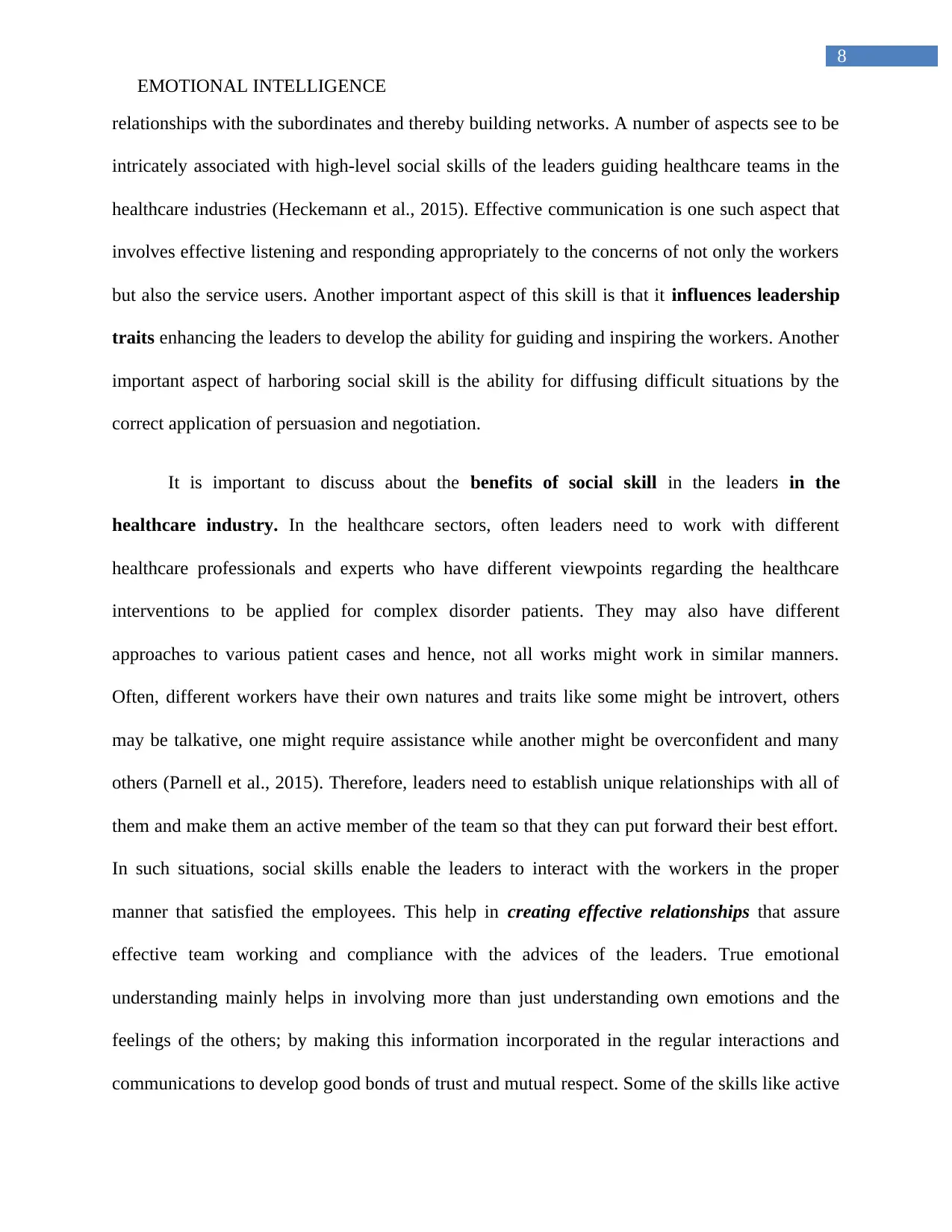
8
EMOTIONAL INTELLIGENCE
relationships with the subordinates and thereby building networks. A number of aspects see to be
intricately associated with high-level social skills of the leaders guiding healthcare teams in the
healthcare industries (Heckemann et al., 2015). Effective communication is one such aspect that
involves effective listening and responding appropriately to the concerns of not only the workers
but also the service users. Another important aspect of this skill is that it influences leadership
traits enhancing the leaders to develop the ability for guiding and inspiring the workers. Another
important aspect of harboring social skill is the ability for diffusing difficult situations by the
correct application of persuasion and negotiation.
It is important to discuss about the benefits of social skill in the leaders in the
healthcare industry. In the healthcare sectors, often leaders need to work with different
healthcare professionals and experts who have different viewpoints regarding the healthcare
interventions to be applied for complex disorder patients. They may also have different
approaches to various patient cases and hence, not all works might work in similar manners.
Often, different workers have their own natures and traits like some might be introvert, others
may be talkative, one might require assistance while another might be overconfident and many
others (Parnell et al., 2015). Therefore, leaders need to establish unique relationships with all of
them and make them an active member of the team so that they can put forward their best effort.
In such situations, social skills enable the leaders to interact with the workers in the proper
manner that satisfied the employees. This help in creating effective relationships that assure
effective team working and compliance with the advices of the leaders. True emotional
understanding mainly helps in involving more than just understanding own emotions and the
feelings of the others; by making this information incorporated in the regular interactions and
communications to develop good bonds of trust and mutual respect. Some of the skills like active
EMOTIONAL INTELLIGENCE
relationships with the subordinates and thereby building networks. A number of aspects see to be
intricately associated with high-level social skills of the leaders guiding healthcare teams in the
healthcare industries (Heckemann et al., 2015). Effective communication is one such aspect that
involves effective listening and responding appropriately to the concerns of not only the workers
but also the service users. Another important aspect of this skill is that it influences leadership
traits enhancing the leaders to develop the ability for guiding and inspiring the workers. Another
important aspect of harboring social skill is the ability for diffusing difficult situations by the
correct application of persuasion and negotiation.
It is important to discuss about the benefits of social skill in the leaders in the
healthcare industry. In the healthcare sectors, often leaders need to work with different
healthcare professionals and experts who have different viewpoints regarding the healthcare
interventions to be applied for complex disorder patients. They may also have different
approaches to various patient cases and hence, not all works might work in similar manners.
Often, different workers have their own natures and traits like some might be introvert, others
may be talkative, one might require assistance while another might be overconfident and many
others (Parnell et al., 2015). Therefore, leaders need to establish unique relationships with all of
them and make them an active member of the team so that they can put forward their best effort.
In such situations, social skills enable the leaders to interact with the workers in the proper
manner that satisfied the employees. This help in creating effective relationships that assure
effective team working and compliance with the advices of the leaders. True emotional
understanding mainly helps in involving more than just understanding own emotions and the
feelings of the others; by making this information incorporated in the regular interactions and
communications to develop good bonds of trust and mutual respect. Some of the skills like active
⊘ This is a preview!⊘
Do you want full access?
Subscribe today to unlock all pages.

Trusted by 1+ million students worldwide
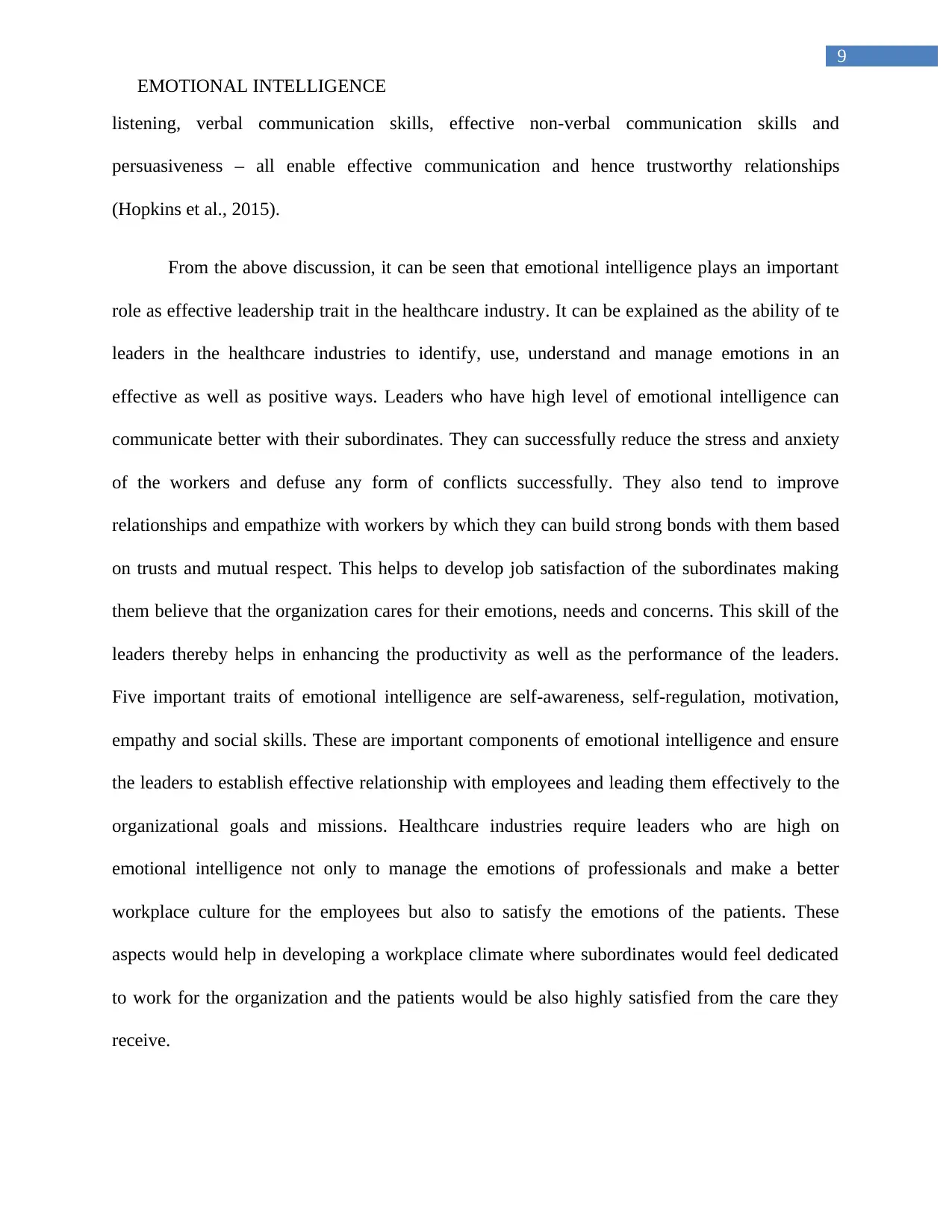
9
EMOTIONAL INTELLIGENCE
listening, verbal communication skills, effective non-verbal communication skills and
persuasiveness – all enable effective communication and hence trustworthy relationships
(Hopkins et al., 2015).
From the above discussion, it can be seen that emotional intelligence plays an important
role as effective leadership trait in the healthcare industry. It can be explained as the ability of te
leaders in the healthcare industries to identify, use, understand and manage emotions in an
effective as well as positive ways. Leaders who have high level of emotional intelligence can
communicate better with their subordinates. They can successfully reduce the stress and anxiety
of the workers and defuse any form of conflicts successfully. They also tend to improve
relationships and empathize with workers by which they can build strong bonds with them based
on trusts and mutual respect. This helps to develop job satisfaction of the subordinates making
them believe that the organization cares for their emotions, needs and concerns. This skill of the
leaders thereby helps in enhancing the productivity as well as the performance of the leaders.
Five important traits of emotional intelligence are self-awareness, self-regulation, motivation,
empathy and social skills. These are important components of emotional intelligence and ensure
the leaders to establish effective relationship with employees and leading them effectively to the
organizational goals and missions. Healthcare industries require leaders who are high on
emotional intelligence not only to manage the emotions of professionals and make a better
workplace culture for the employees but also to satisfy the emotions of the patients. These
aspects would help in developing a workplace climate where subordinates would feel dedicated
to work for the organization and the patients would be also highly satisfied from the care they
receive.
EMOTIONAL INTELLIGENCE
listening, verbal communication skills, effective non-verbal communication skills and
persuasiveness – all enable effective communication and hence trustworthy relationships
(Hopkins et al., 2015).
From the above discussion, it can be seen that emotional intelligence plays an important
role as effective leadership trait in the healthcare industry. It can be explained as the ability of te
leaders in the healthcare industries to identify, use, understand and manage emotions in an
effective as well as positive ways. Leaders who have high level of emotional intelligence can
communicate better with their subordinates. They can successfully reduce the stress and anxiety
of the workers and defuse any form of conflicts successfully. They also tend to improve
relationships and empathize with workers by which they can build strong bonds with them based
on trusts and mutual respect. This helps to develop job satisfaction of the subordinates making
them believe that the organization cares for their emotions, needs and concerns. This skill of the
leaders thereby helps in enhancing the productivity as well as the performance of the leaders.
Five important traits of emotional intelligence are self-awareness, self-regulation, motivation,
empathy and social skills. These are important components of emotional intelligence and ensure
the leaders to establish effective relationship with employees and leading them effectively to the
organizational goals and missions. Healthcare industries require leaders who are high on
emotional intelligence not only to manage the emotions of professionals and make a better
workplace culture for the employees but also to satisfy the emotions of the patients. These
aspects would help in developing a workplace climate where subordinates would feel dedicated
to work for the organization and the patients would be also highly satisfied from the care they
receive.
Paraphrase This Document
Need a fresh take? Get an instant paraphrase of this document with our AI Paraphraser
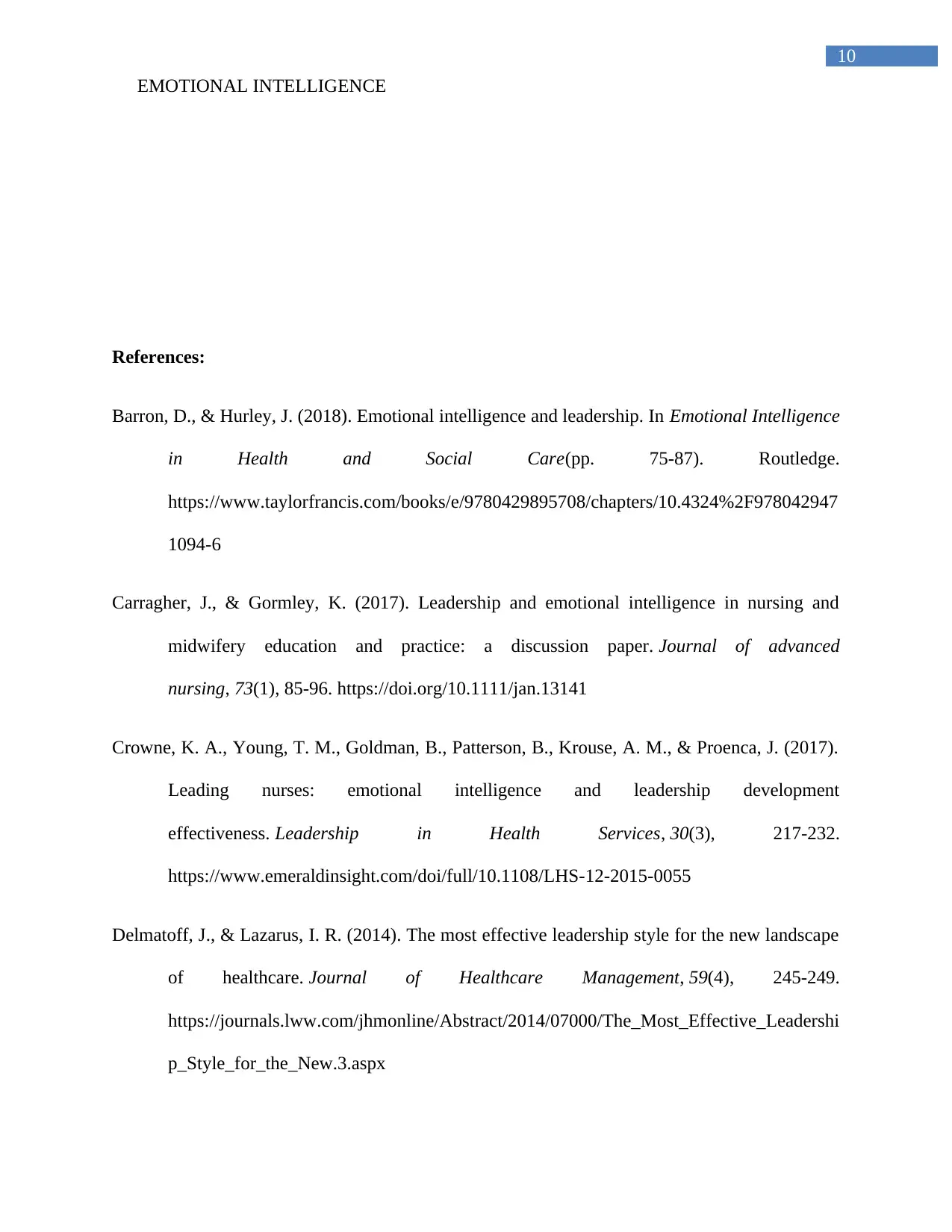
10
EMOTIONAL INTELLIGENCE
References:
Barron, D., & Hurley, J. (2018). Emotional intelligence and leadership. In Emotional Intelligence
in Health and Social Care(pp. 75-87). Routledge.
https://www.taylorfrancis.com/books/e/9780429895708/chapters/10.4324%2F978042947
1094-6
Carragher, J., & Gormley, K. (2017). Leadership and emotional intelligence in nursing and
midwifery education and practice: a discussion paper. Journal of advanced
nursing, 73(1), 85-96. https://doi.org/10.1111/jan.13141
Crowne, K. A., Young, T. M., Goldman, B., Patterson, B., Krouse, A. M., & Proenca, J. (2017).
Leading nurses: emotional intelligence and leadership development
effectiveness. Leadership in Health Services, 30(3), 217-232.
https://www.emeraldinsight.com/doi/full/10.1108/LHS-12-2015-0055
Delmatoff, J., & Lazarus, I. R. (2014). The most effective leadership style for the new landscape
of healthcare. Journal of Healthcare Management, 59(4), 245-249.
https://journals.lww.com/jhmonline/Abstract/2014/07000/The_Most_Effective_Leadershi
p_Style_for_the_New.3.aspx
EMOTIONAL INTELLIGENCE
References:
Barron, D., & Hurley, J. (2018). Emotional intelligence and leadership. In Emotional Intelligence
in Health and Social Care(pp. 75-87). Routledge.
https://www.taylorfrancis.com/books/e/9780429895708/chapters/10.4324%2F978042947
1094-6
Carragher, J., & Gormley, K. (2017). Leadership and emotional intelligence in nursing and
midwifery education and practice: a discussion paper. Journal of advanced
nursing, 73(1), 85-96. https://doi.org/10.1111/jan.13141
Crowne, K. A., Young, T. M., Goldman, B., Patterson, B., Krouse, A. M., & Proenca, J. (2017).
Leading nurses: emotional intelligence and leadership development
effectiveness. Leadership in Health Services, 30(3), 217-232.
https://www.emeraldinsight.com/doi/full/10.1108/LHS-12-2015-0055
Delmatoff, J., & Lazarus, I. R. (2014). The most effective leadership style for the new landscape
of healthcare. Journal of Healthcare Management, 59(4), 245-249.
https://journals.lww.com/jhmonline/Abstract/2014/07000/The_Most_Effective_Leadershi
p_Style_for_the_New.3.aspx
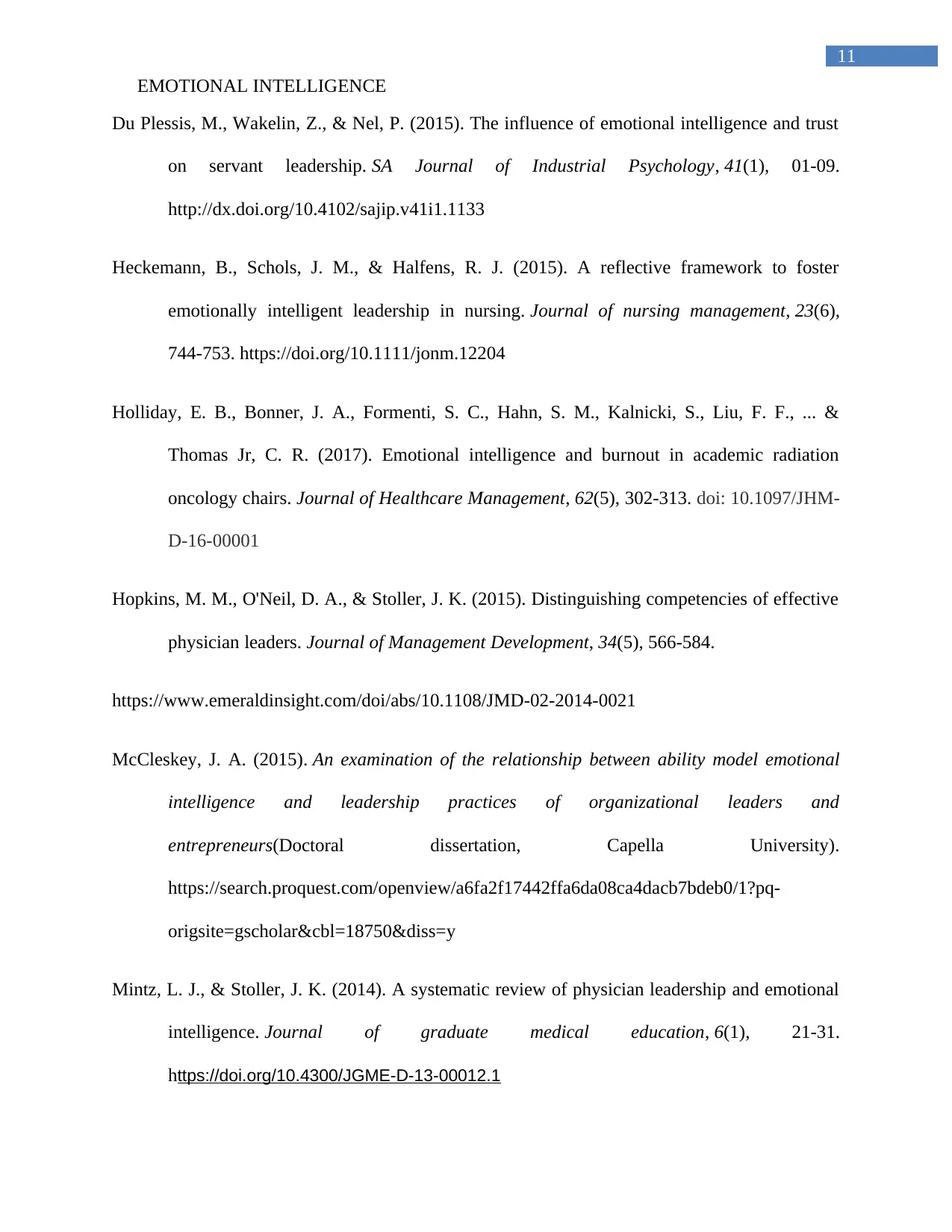
11
EMOTIONAL INTELLIGENCE
Du Plessis, M., Wakelin, Z., & Nel, P. (2015). The influence of emotional intelligence and trust
on servant leadership. SA Journal of Industrial Psychology, 41(1), 01-09.
http://dx.doi.org/10.4102/sajip.v41i1.1133
Heckemann, B., Schols, J. M., & Halfens, R. J. (2015). A reflective framework to foster
emotionally intelligent leadership in nursing. Journal of nursing management, 23(6),
744-753. https://doi.org/10.1111/jonm.12204
Holliday, E. B., Bonner, J. A., Formenti, S. C., Hahn, S. M., Kalnicki, S., Liu, F. F., ... &
Thomas Jr, C. R. (2017). Emotional intelligence and burnout in academic radiation
oncology chairs. Journal of Healthcare Management, 62(5), 302-313. doi: 10.1097/JHM-
D-16-00001
Hopkins, M. M., O'Neil, D. A., & Stoller, J. K. (2015). Distinguishing competencies of effective
physician leaders. Journal of Management Development, 34(5), 566-584.
https://www.emeraldinsight.com/doi/abs/10.1108/JMD-02-2014-0021
McCleskey, J. A. (2015). An examination of the relationship between ability model emotional
intelligence and leadership practices of organizational leaders and
entrepreneurs(Doctoral dissertation, Capella University).
https://search.proquest.com/openview/a6fa2f17442ffa6da08ca4dacb7bdeb0/1?pq-
origsite=gscholar&cbl=18750&diss=y
Mintz, L. J., & Stoller, J. K. (2014). A systematic review of physician leadership and emotional
intelligence. Journal of graduate medical education, 6(1), 21-31.
https://doi.org/10.4300/JGME-D-13-00012.1
EMOTIONAL INTELLIGENCE
Du Plessis, M., Wakelin, Z., & Nel, P. (2015). The influence of emotional intelligence and trust
on servant leadership. SA Journal of Industrial Psychology, 41(1), 01-09.
http://dx.doi.org/10.4102/sajip.v41i1.1133
Heckemann, B., Schols, J. M., & Halfens, R. J. (2015). A reflective framework to foster
emotionally intelligent leadership in nursing. Journal of nursing management, 23(6),
744-753. https://doi.org/10.1111/jonm.12204
Holliday, E. B., Bonner, J. A., Formenti, S. C., Hahn, S. M., Kalnicki, S., Liu, F. F., ... &
Thomas Jr, C. R. (2017). Emotional intelligence and burnout in academic radiation
oncology chairs. Journal of Healthcare Management, 62(5), 302-313. doi: 10.1097/JHM-
D-16-00001
Hopkins, M. M., O'Neil, D. A., & Stoller, J. K. (2015). Distinguishing competencies of effective
physician leaders. Journal of Management Development, 34(5), 566-584.
https://www.emeraldinsight.com/doi/abs/10.1108/JMD-02-2014-0021
McCleskey, J. A. (2015). An examination of the relationship between ability model emotional
intelligence and leadership practices of organizational leaders and
entrepreneurs(Doctoral dissertation, Capella University).
https://search.proquest.com/openview/a6fa2f17442ffa6da08ca4dacb7bdeb0/1?pq-
origsite=gscholar&cbl=18750&diss=y
Mintz, L. J., & Stoller, J. K. (2014). A systematic review of physician leadership and emotional
intelligence. Journal of graduate medical education, 6(1), 21-31.
https://doi.org/10.4300/JGME-D-13-00012.1
⊘ This is a preview!⊘
Do you want full access?
Subscribe today to unlock all pages.

Trusted by 1+ million students worldwide
1 out of 14
Related Documents
Your All-in-One AI-Powered Toolkit for Academic Success.
+13062052269
info@desklib.com
Available 24*7 on WhatsApp / Email
![[object Object]](/_next/static/media/star-bottom.7253800d.svg)
Unlock your academic potential
Copyright © 2020–2026 A2Z Services. All Rights Reserved. Developed and managed by ZUCOL.





